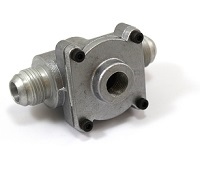So where do people take an oil temp reading from?
One needs to install an after market sensor + gauge somewhere, the OEM setup doesn't bother.

Posted 03 January 2019 - 07:25 AM
So where do people take an oil temp reading from?
One needs to install an after market sensor + gauge somewhere, the OEM setup doesn't bother.
Posted 03 January 2019 - 08:43 AM
I employed a rudimentry approach to oil temps and just stick those temperature telltale stickers on the sump and various other palces to see what it peaked at.. yes they can be influenced by external temperature too and dosent factor in heat loss in the sump metal, but it gave a reasonable clue.
Nev, some extra oil capacity would surely give you a longer service interval, so potentially reducing costs as opposed to increasing them.
Posted 03 January 2019 - 11:42 AM
So where do people take an oil temp reading from?
Depends on what you want to measure ![]()
If you want to se the peak 'worked' oil temperature then usually this can be found in the oil sump and the sensor a little above the level of the drain plug so it's exposed to the hottest oil as it falls down from the block and head. If you look at the angle of the engine you should put it on the side where the oil from the head will flow/drain down the wall of the block. (yeah yeah.. the oil sloshes in the sump and gets churned, so temperature differences will be pretty small, but if you have a good sensor and some datalogging stuff you do see a few degree difference)
This will pretty much be the peak temperature the oil reaches once it has been mangled and squished inside the engine.
A temperature sensor in a takeoff at the oil filter usually shows you the temperature as it has been sucked up by the oil pump from the bottom of the sump and before it goes into the filter.
If an external oil cooler is fitted you can put something like a MOCAL oil temperature adapter in oil lines and thread a sensor into that:

And get the temps of either going in or out of the oil cooler (and in the latter case as it enters the block to be mangled again ![]() ) if you're interested in seeing how efficient the cooler is.
) if you're interested in seeing how efficient the cooler is.
Most regular engines do run normal oil temps of about 90-100C on longer trips as you also want to boil any water/condensation and other contamination like petrol from cold starts out as quick as possible. Usually (competition) oil thermostats and such towards external (air-)coolers only open at around 84C.
Bye, Arno.
Posted 03 January 2019 - 12:24 PM
Just plumb a laminova oil cooler into the engine coolant system. Light, small and efficient. No need for a thermostat, oil temperature will -try to- follow coolant temp. I have one in my car instead of the standard Z22SE or B207 coolers. Haven't even come close to really make the engine do some work, but it does seem to do the trick. And easy to install. I recently saw one on the Batmobile, so it has to be good.
Posted 03 January 2019 - 01:47 PM
turbo already has a oil/water cooler/prewarmer , plus a thermostat bypass. its almost like cosworth knew what they were doing
Posted 04 January 2019 - 05:39 PM
I see 130° on track. (turbo 280hp)
WOW!
Hope you are running some damn good oil for that
From memory, and mr Fez will likely correct, MOST engine oil is happy to 110Deg C and the fancier stuff is happy to around 120Deg C before they start to breakdown etc.
130 doesn't seem huge for me. I've seen so many race cars with way more and no problems...
One time an engineer from Igol says me that up to 160°, everything is OK (but he was talking about ceramic f1 oil).
What about the thermostat bypass, is it not a good idea to remove it for track use. I don't see the utility with a water/oil cooler.
Posted 05 January 2019 - 07:49 PM
I used to change my oil every 1000 miles previously, now changing it every 1500 miles.
As I am likely going to take the clam off soon to replace my worn out gearbox, I was considering sticking an oil cooler in as it would be a good moment.
Some of the "incidental" evidence I've noticed on my engine is:
1. Requires w50 oil for winter or w60 for summer, or it leaks from a variety of seals.
2. Contrary to the presumptive track-day know-it-alls I get the feeling my engine oil sees higher temps than almost any VX220 based on evidence like:
a) The brittle colour stained stainless steel (304/316) in my exhaust box, highly unusual and indicative of VERY high temps.
b/ Thick welds failing on the exhaust manifold, probably/at least partly heat induced.
c) I know how hard I push it at times, and some of the 450 odd KWatts of heat ends up in the oil for sure.
d) I have oil squirters under the pistons, which can only add to the heat in the oil.
3. The oil seems to lose it's viscosity quickly (I've done some DIY viscosity tests), might well be due to petrol soak though.
4. Necessity to run without a floor pan or everything overheats (when pushing on).
Nev, you won't see enough mechanical shear of the oil to cause viscosity drop over that mileage range (it's a function of shear through the bearings so very mileage dependent). It will be fuel dilution.
Bear in mind that max. engine temperature doesn't relate much to maximum oil temperature. You'll see a maximum of around 260-280 deg. C at full load in the top ring of the piston, this is basically controlled by rate of evaporation of the oil so will not go much higher. Bulk sump temperature will be a lot lower, likely peaking at 110 for you , sustained loads might push it up to 130 but that really does represent an extreme (the only time we got an actual vehicle to a sump temperature of 130 was by bypassing the oil cooler ad simulating a continuous 30 degree climb with a fully loaded trailer). Between the evaporation limited piston temperature and bulk temperature, you are not too far away from typical high load conditions so I would really encourage you to focus on fuel dilution more.
If you want to confirm this, try the following;
Oil analysis of fresh oil verses drain oil, including ICP and KV40 and KV100. No need for anything else (these are cheap tests, the others add a lot of cost).
What will this tell you?
- ICP - do you have any wear metals in the system? (iron will be very generalised from many different surfaces but copper will make me worry)
(note: ICP is very useful if you want to track how your engine is wearing over time. changes in iron levels are important to track, but absolute values don't mean too much as they are very dependent on engine build and design)
- KV40, have you actually experienced any fuel dilution vs. the fresh oil
- KV100 - as above, but will look at mechanical shear more as fuel dilution will be more pronounced at low temperature KV at 40 deg. C and shear more obvious at 100 deg. C
There are a few test labs that offer this for a relatively reasonable cost, these appear to offer it for 30 GBP
http://www.theoillab...testing/engine/
http://www.millersoi...es/oil-analysis
Posted 07 January 2019 - 11:59 AM
so are you going to change your current oil cooler for a bigger one or add an additional one?
Wondering if it's worth sticking a 21+ row (air cooled) additional one in the left ear which I've kept empty for 8 years for this sole purpose!
Problem is it's extra weight yet again on a 960 Kg car, and extra oil capacity/cost every time I change oil, not to mention the extra cost + effort to install it in the first place.
Posted 08 January 2019 - 09:51 AM
I see 130° on track. (turbo 280hp)
WOW!
Hope you are running some damn good oil for that
From memory, and mr Fez will likely correct, MOST engine oil is happy to 110Deg C and the fancier stuff is happy to around 120Deg C before they start to breakdown etc.
130 doesn't seem huge for me. I've seen so many race cars with way more and no problems...
One time an engineer from Igol says me that up to 160°, everything is OK (but he was talking about ceramic f1 oil).
What about the thermostat bypass, is it not a good idea to remove it for track use. I don't see the utility with a water/oil cooler.
Why bypass the stat?
The oil will take longer to warm up (although possibly quicker with a water/oil cooler) and the same NET temperature will happen the same as one with a stat.
Posted 08 January 2019 - 06:11 PM
I certainly don't understand well the oil circuit. I couldn't find a nice oil circuit diagram.
If the oil goes trough the water/oil exchanger directly (without the thermostat bypass) will not warm it faster when the engine is cold ? (water warm faster than oil)
And without bypass, perhaps there will be a little less pressure drop when engine is hot.
0 members, 0 guests, 0 anonymous users